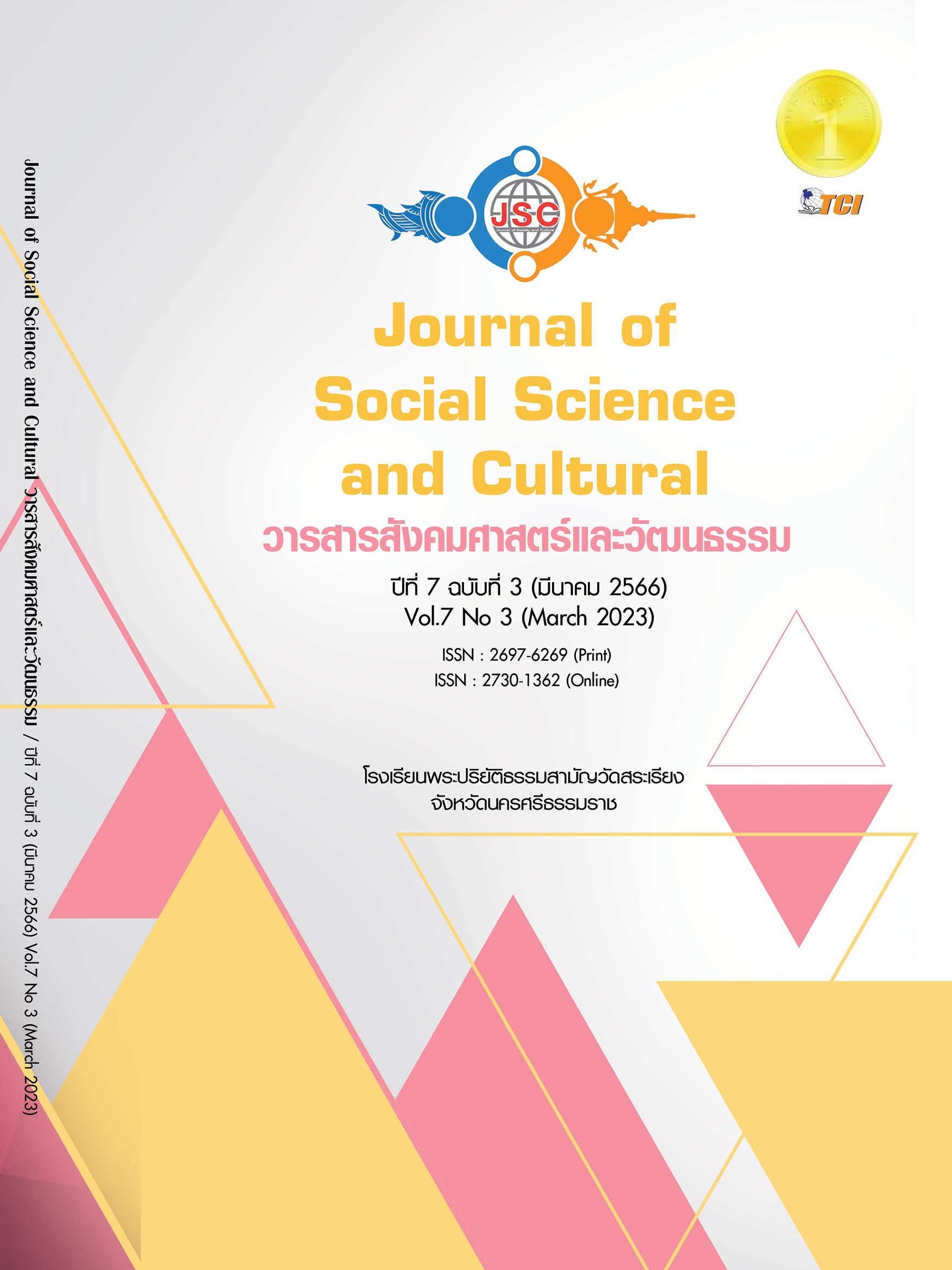EFFECTS OF LEARNING MANAGEMENT BY USING THE FLIPPED CLASSROOM INTEGRATED WITH KWDL TECHNIQUE ON THE MATHEMATICAL WORD PROBLEM-SOLVING ABILITIES OF PRIMARY 4 STUDENTS UNDER STATE UNIVERSITY
Main Article Content
Abstract
The purposes of this research were to compare the mathematical word problem-solving abilities of primary 4 students under State University: 1) before and after learning management by using Flipped Classroom Integrated with KWDL technique, 2) before and after learning management by using a traditional method, and 3) between the abilities of those using Flipped Classroom Integrated with KWDL technique and those using the traditional method. Used quasi-experimental research methodology. The samples used in the research were 60 Primary 4 students studying at the Innovation Demonstration School of Rajamangala University of Technology in Pathum Thani Province in the first semester of the academic year 2022. Two learning management methods were entered into two classrooms by simple randomization. The research instruments included a lesson plan for Flipped Classroom Integrated with KWDL, a lesson plan for the traditional method, and tests for mathematical word problem-solving abilities. The data were analyzed by using mean, standard deviation, and t-test. The research results indicated that: 1) the student’s mathematical word problem-solving abilities after learning by using Flipped Classroom integrated with KWDL technique were significantly higher than those before learning at .05 level of significance, 2) the student’s mathematical word problem-solving abilities after learning by using a traditional method were significantly higher than those before learning at .05 level of significance, and 3) the students’ mathematical word problem-solving abilities of the students who learned by using Flipped Classroom Integrated with KWDL technique were significantly higher than those of the students who learned by using the traditional method at .05 level of significance.
Article Details
References
กัญญาภรณ์ สีนินทิน. (2558). การพัฒนาทักษะการแก้โจทย์ปัญหาวิชาคณิตศาสตร์ เรื่อง บทประยุกต์โดยการจัดการเรียนรู้แบบร่วมมือเทคนิค TAI ร่วมกับเทคนิค KWDL ของนักเรียนชั้นมัธยมศึกษาปีที่ 5. ใน วิทยานิพนธ์ปริญญามหาบัณฑิต สาขาวิชาการวิจัยและพัฒนาหลักสูตร. มหาวิทยาลัยเทคโนโลยีราชมงคลธัญบุรี.
กิตติพันธ์ วิบุลศิลป์. (2560). ผลการจัดกิจกรรมการเรียนรู้คณิตศาสตร์ ตามแนวคิดห้องเรียนกลับทาง ร่วมกับการเรียนรู้เชิงรุกที่มีต่อความสามารถในการแก้ปัญหาคณิตศาสตร์ และความสามารถในการคิดอย่างมีวิจารณญาณของนักเรียนชั้นมัธยมศึกษาปีที่ 5. ใน วิทยานิพนธ์ปริญญามหาบัณฑิต สาขาการศึกษาคณิตศาสตร์. จุฬาลงกรณ์มหาวิทยาลัย.
โชติกา สิงห์ป้อง. (2562). การพัฒนาทักษะการแก้โจทย์ปัญหาทางคณิตศาสตร์ โดยการจัดการเรียนรู้แบบร่วมมือรูปแบบSTAD ร่วมกับเทคนิค KWDL ของนักเรียนชั้นประถมศึกษาปีที่ 3. ใน วิทยานิพนธ์ปริญญามหาบัณฑิต สาขาวิชาการพัฒนาหลักสูตรและนวัตกรรมการสอน. มหาวิทยาลัยเทคโนโลยีราชมงคลธัญบุรี.
เบญจลักษณ์ ภูสามารถ, ณัฏฐชัย จันทชุม และธัญญลักษณ์ เขจรภักดิ์. (2564). การพัฒนาความสามารถในการแก้โจทย์ โดยใช้กิจกรรมการเรียนรู้ เทคนิค KWDL ของนักเรียนชั้นประถมปีที่ 5. วารสารมหาวิทยาลัยราชภัฏร้อยเอ็ด, 15 (2), 146-153.
รุ่งนภา นุตราวงศ์. (2557). แบบห้องเรียนกลับด้าน (Flip Your Classroom). วารสารวิชาการ, 17 (1), 2-13.
วิจารณ์ พานิช. (2556). ครูเพื่อศิษย์สร้างห้องเรียนกลับทาง. นนทบุรี: บริษัท เอส.อาร์.พริ้นติ้ง แมสโปรดักส์ จำกัด.
สํานักงานคณะกรรมการการศึกษาขั้นพื้นฐาน. (2560). มาตรฐานการเรียนรู้และตัวชี้วัดกลุ่มสาระการเรียนรู้คณิตศาสตร์ วิทยาศาสตร์ และสาระภูมิศาสตร์ในกลุ่มสาระการเรียนรู้สังคมศึกษา ศาสนา และวัฒนธรรม (ฉบับปรับปรุง พ.ศ. 2560) ตามหลักสูตรแกนกลางการศึกษาขั้นพื้นฐาน พุทธศักราช2551. กรุงเทพมหานคร: โรงพิมพ์ชุมนุมสหกรณ์การเกษตรแห่งประเทศไทย จํากัด.
สํานักงานคณะกรรมการการศึกษาขั้นพื้นฐาน. (2564). ระบบบริหารจัดการสอบ. เรียกใช้เมื่อ 10 พฤษภาคม 2565 จาก https://shorturl.asia/h0BXL
สำนักงานเลขาธิการสภาการศึกษา. (2562). มาตรฐานการศึกษาชาติ พ.ศ. 2561. กรุงเทพมหานคร: บริษัท 21 เซ็นจูรี่ จำกัด.
สิทธิวัฒน์ ทูลภิรมย์. (2564). การจัดการเรียนรู้ด้วยรูปแบบKWDL เพื่อส่งเสริมความสามารถในการคิดอย่างมีวิจารณญาณ และการแก้ปัญหาทางคณิตศาสตร์ เรื่อง ฟังก์ชันเอกซ์โพเนนเชียลสำหรับนักเรียนชั้นมัธยมศึกษาปีที่ 4. วารสารมนุษยศาสตร์และสังคมศาสตร์ มหาวิทยาลัยราชภัฏสุรินทร์, 23 (1), 31-44.
อารยา ช่ออังชัญ และวัชรา เล่าเรียนดี. (2554). การพัฒนารูปแบบการเรียนการสอนเพื่อส่งเสริมความสามารถในการคิดแก้ปัญหาอย่างมีวิจารญาณ กลุ่มสาระการเรียนรู้วิทยาศาสตร์ของนักเรียนชั้นประถมศึกษาปีที่ 5. วารสารศิลปากรศึกษาศาสตร์วิจัย, 2 (2), 94-107.
Algarni, B. & Lortie-Forgues, H. (2022). An evaluation of the impact of flipped-classroom teaching on mathematics proficiency and self-efficacy in Saudi Arabia. British Journal of Educational Technology, 54(1), 414-435.
Bergmann, J. & Sams, A. (2012). Flip your classroom: Reach every student in every class every day. International Society for Technology in Education. Retrieved May 10, 2022, from https://shorturl.asia/4Xzt9
Best, J. W. & Kahn, J. V. (2003). Research in Education (9th ed.) . Boston: A Pearson Educational Company.
Chai, C. S. & Koh, J. H. L. (2013). Flipping the classroom to enhance mathematics learning in Singapore. International Journal of Science and Mathematics Education, 11 (3), 581-599.
Fernández-Martín, F. D., et al. (2020). Impact of the flipped classroom method in the mathematical area: A systematic review. Mathematics, 8 (12), 2162.
Lencastre, J. A., et al. (2020). A systematic review on the flipped classroom model as a promoter of curriculum innovation. International Journal of Instruction, 13 (4), 575-592.
Nja, C. O., et al. (2022). Students’ attitude and academic achievement in a flipped classroom. Heliyon, 8 (1), e08792.
Ramadoni. & Mustofa, M. (2022). Enhancing Flipped Classroom with Peer Teaching to Promote Students’ Conceptual Understanding and Self-Efficacy in Calculus Courses. Pegem Egitim ve Ogretim Dergisi, 12 (3), 54-168.
Smith, J. (2019). Strategies for teaching abstract mathematical concepts to struggling students. Journal of Mathematics Education, 12 (2), 43-56.


